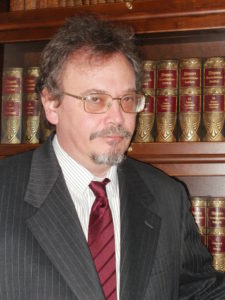
Topic: Neuroglia: supportive cells that protect the brain
Speaker: Prof. Olexiy Verkhratsky, University of Manchester, UK
Date: Friday, 6 July 2018
Time: 17:00 – 19:00
Venue: Embassy of Ukraine in the Federal Republic of Germany, Albrechtstraße 26, 10117 Berlin
This lecture will be given in English. Questions could be asked both in German and Ukrainian. Please register by 4.07: berlin (at) ukrainet.eu (At registration please provide your name, affiliation (if applicable) and place of residence, according to the security requirements of the embassy).
Announcement download: in English, in German, in Ukrainian
The Talk The human brain is made out of 200 billion neural cells that are divided into neurones, which process the information and govern the body, and neuroglia, which support neurones and defend the brain. These glial cells maintain brain homeostasis, support interneuronal connection forming brain connectome and guard the brain against pathological insults. Active responses of glia contain neuropathology, whereas gliodegeneration and loss of glial function facilitate evolution of neurological diseases, including neuropsychiatric and neurodegenerative disorders, such as, e.g. major depression or Alzheimer’s disease. Targeting neuroglia may constitute a novel therapeutic strategy.
The Speaker Olexiy (Alexei) Verkhratsky is an internationally renowned scientist in the field of cellular neurophysiology. He completed his doctorate at the Bogomoletz Institute of Physiology, Kyiv, Ukraine (1986). During his international scientific career, he worked as a leading scientist at the Max Delbrück Center for Molecular Medicine (MDC) in Berlin Buch (1993, 1995-1999). Since 2002 he is Professor of Neurophysiology, Faculty of Biosciences at the University of Manchester in the UK. Verkhratsky is one of the 30 most cited European scientists in the field of “Basic Neurosciences”: He authored and edited 12 books and published ~ 400 papers, which were cited >20,000 times, H-index is 77. His academic achievements were recognized internationally: Olexiy Verkhratsky is a member of the Leopoldina, German Academy of Sciences, Academia Europaea, Polish Academy of Sciences and Royal Academy of Pharmacy of Spain.
Verkhratsky’s research is concentrated on the mechanisms of inter- and intracellular signalling in the central nervous system, being especially focused on two main types of neural cells, on neurones and neuroglia. He made important contributions to understanding the chemical and electrical transmission in reciprocal neuronal-glial communications and on the role of intracellular Ca2+ signals in the integrative processes in the nervous system. Many of his studies are dedicated to investigations of cellular mechanisms of neurodegeneration. Verkhratsky was the first to perform intracellular Ca2+ recordings in old neurones in isolation and in situ, which provided direct experimental support for “Ca2+ hypothesis of neuronal ageing”. In recent years he studies the glial pathology in Alzheimer disease. He authored a pioneering hypothesis of astroglial atrophy as a mechanism of neurodegeneration.
